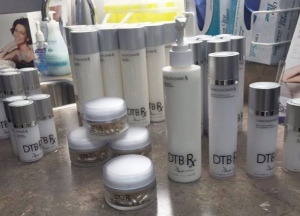Over-the-Counter Skin Care Versus Cosmeceuticals: What Is Best?
 In the winter, cold air hits the skin with force as people scurry from their cars to the cover of warmth. “Winter doesn’t bring only cold temperatures, but lower humidity too,” explains Dr. Jillian Macdonald, Royal College-certified dermatologist at The Ottawa Clinic. “This pulls moisture from people’s skin causing conditions such as asteatotic dermatitis, or eczema.”
In the winter, cold air hits the skin with force as people scurry from their cars to the cover of warmth. “Winter doesn’t bring only cold temperatures, but lower humidity too,” explains Dr. Jillian Macdonald, Royal College-certified dermatologist at The Ottawa Clinic. “This pulls moisture from people’s skin causing conditions such as asteatotic dermatitis, or eczema.”
Cosmeceuticals, or pharmaceutical-strength skin care products, often contain retinol, a derivative of Vitamin A that helps regulate the turnover of the skin and shed the dry, damaged cells; hyaluronic acid, which supports the connective tissue layer of the skin; and gluconolactone which has moisturizing and anti-oxidant activity. These substances are active in both the epidermal and collagen layers of the skin as they enhance your body’s own ability to correct and regenerate skin.
Finding Effective Wintertime Skin Care
Over-the-counter products available at the drug store or supermarket often contain preservatives, fragrances, and potential allergens which can be drying and irritating to already-sensitive skin. Materials such as sodium lauryl sulfate (SLS), a chemical used to help materials penetrate the surface of the skin, are found in more than 90 per cent of personal hygiene products. SLS is a known skin irritant, and is often used in engine degreasers and industrial strength cleaning agents.
“Skin care doesn’t have to be complicated, just smart! Use fewer but highly-effective products,” explains Dr. Macdonald. “Daniel Thompson Beauty, a leader in natural skin care and cosmetics, offers a specialized collection called DTB Rx. The products contain retinol and hyaluronic acid and can be used on all skin types. They are a great fix for lackluster winter skin and for long-term skin health.”
Curious to learn more? Visit our online store, click to book online or call for a consultation!